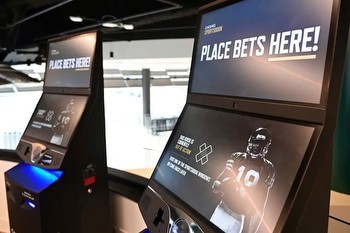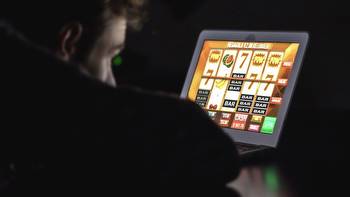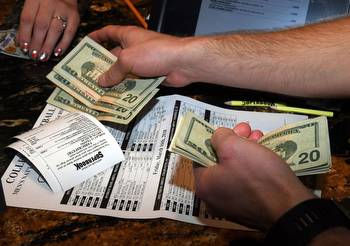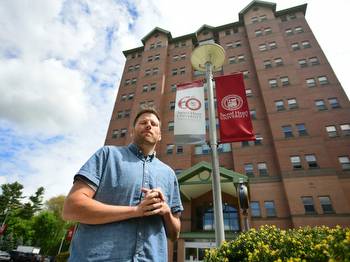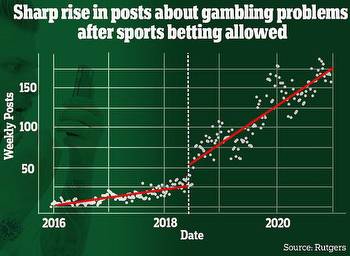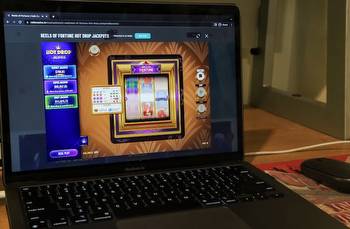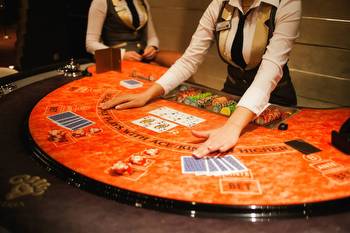‘Caesarization’ of MSU athletics: Secret deal promotes online gambling
In September 2021, 18 months into the COVID pandemic, Michigan State University’s athletic program faced dwindling coffers. A USA Today public records request found the department had lost $15.4 million during the 2020-2021 fiscal year, the impact of the pandemic having shuttered much of the department’s revenue-generating activity.
The department’s social media and brand managing partner, PlayFly, brought a deal to the table that could plug some of the financial woes. Caesars Sportsbook was offering MSU an exclusive deal worth $8.4 million over five years.
“Caesars Sportsbook will gain significant exposure through MSU’s sports properties and access to a wide range of hospitality assets and VIP experiences, which will be available to Caesars Sportsbook players, as part of the wide range of benefits offered through the industry-leading loyalty program, Caesars Rewards,” a January 2022 press release from Caesars Entertainment declared.
“Assets include broadcast and digital content across MSU athletics, TV-visible signage across basketball, football and hockey, naming entitlement for a new premium seating area inside Spartan Stadium set to debut during the 2022 football season along with an outdoor tailgating area, and access to unique alumni and fan engagement opportunities surrounding varsity sports seasons currently underway. Spartan fans can also soon enjoy special emperor-worthy promotional offers on mobile sports betting, iGaming, and The World Series of Poker (WSOP®) product offerings.”
MSU had been effectively “Caesarized.”
The evidence couldn’t be clearer than at Spartan Stadium, where an endzone-wide digital billboard shouts “DOWNLOAD THE CAESARS SPORTBOOK & CASINO APP” alongside an image of the iconic green and white Spartan helmet and the declaration: “Official Sports Betting Partner of Spartan Athletics.”
The deal was negotiated in secret, The New York Times reported, because the contract was with PlayFly, an MSU vendor and private company not subject to Michigan’s Freedom of Information Act, shielding the details from prying eyes.
MSU spokesman Dan Olsen declined to discuss the deal or the process with City Pulse. The branding partner to MSU did not respond to media inquiries.
MSU sophomore Connor Li, 19, said he noticed the “Caesarization” of MSU immediately last autumn on his way to football games.
“I thought it was interesting that MSU would make a deal with companies that deal with an addictive property when we have like strict rules against like making brand deals with alcohol, making brand deals with nicotine and all that,” said Li, a Lansing-area native who majors in history and political science. “So, I thought it was a very interesting choice to make a deal with gambling.”
While Li has been inundated by marketing schemes of the online gambling platforms, he said he has not been tempted or interested in engaging with them. At 19, it would be illegal for him to use the platforms, but he said he has discussed online gambling with some of his acquaintances who are gambling.
His attitude is that the money his friends are gambling with is theirs to do with as they wish. It’s an uncomfortable topic to broach, because of his own value system. When asked if he would have the same response if an acquaintance came out of a bathroom talking about doing a line of cocaine, he said the danger and difference between the two potential addictions were so broad it was difficult to compare them.
Li said the revelations that MSU had been assured the details of the deal would remain secret was “really concerning.”
The concern stretches beyond the secrecy for Michael Burke, a board member of the Michigan Association on Problem Gambling. The 77-year-old has spent 25 years making amends for his own gambling addiction that landed him in Jackson prison for three years and earned him an order to pay back $1.6 million he had stolen from his law clients. The money he stole went to pay off his gambling debts at Michigan casinos.
“It’s just going to create major problems for kids who should be working on their studies, working on getting their life started and all that,” he said. “This is what they’re gonna be faced with. We know that 7% of the kids are going to be predisposed to a gambling problem, and then you just give them free plays.”
He said that when gambling was constrained to physical spaces like casinos, developing deep debts and depression from gambling addiction took years, sometimes decades to reveal itself in a gambler’s life. But online gambling platforms have accelerated that crisis point to as little as five months.
In the last year, 75% of college students engaged in gambling, according to data from the National Association on Problem Gambling. It shows that overall 67% of college students bet on sports.
The NCAA prohibits college athletes and athletic employees from engaging in gambling. But their own data shows student athletes are gambling. According to the NCAA, 24% of male athletes and 5% of female athletes were gamblers, with 9% of men and 1% of women gambling monthly. And online gambling platforms have enticed many male athletes, NCAA data shows. Of male athletes, 26% said their first exposure to gambling was an online gambling platform. Astonishingly, many of the gambling athletes started placing wagers before they were even in college: 90% of of men and 82% of women, which means while they were under the age of 21.
Last month, the American Gaming Association released new, stricter guidelines governing partnerships and promotion of online gambling to colleges. The problem? Caesars is not a member of the organization — it cut ties in 2020.
Sen. Richard Blumenthal, D-Connecticut, told The New York Times last month that the move was a “major step.” But he expressed skepticism that self-regulation would work and is pushing a federal law that would enshrine the AGA rules in law, forcing even the giants like Caesars to bow to regulations to protect students.
Li said he would support federal regulation.
“If colleges have strict rules against other addictive substances and properties, why can’t we have another rule against this?” He asked.
And Li also has concerned that online gambling could lead to risks to the safety of athletes as well.
“If people bet on a game and then the team loses, the hate that the players will receive because they lost a game and because that person lost money — that’s a concern for me,” Li said.









